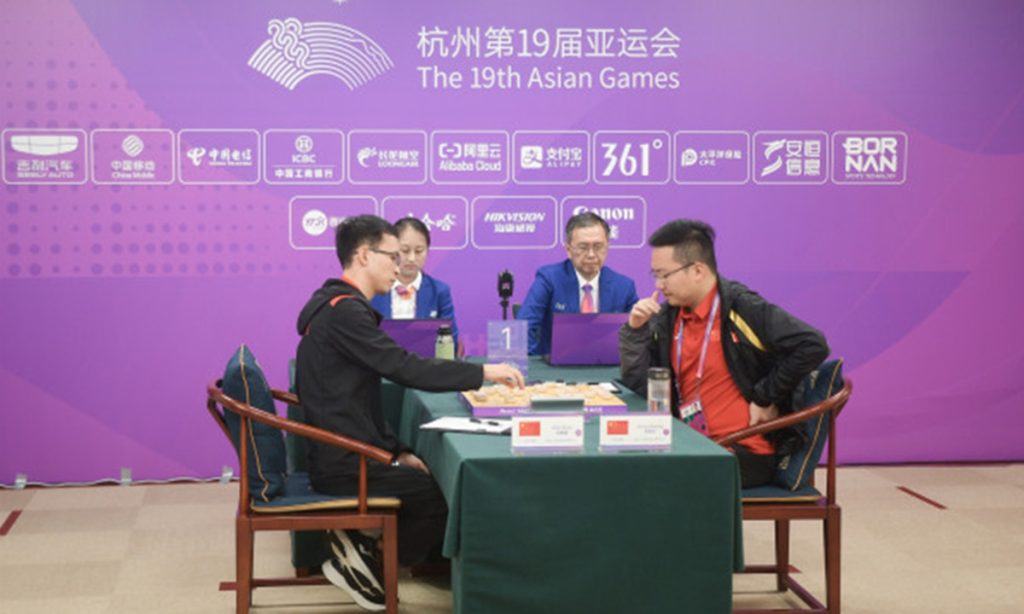200th gold medal of great significance: Xiangqi master

It was an arduous journey to win the 200th gold medal for the Chinese delegation at the Hangzhou Asian Games and the victory of special significance, Chinese chess grand master told the Global Times upon his arrival to Beijing on Monday evening.
During the men's individual final of Xiangqi, or Chinese chess, at the Games on Saturday, Zheng Weitong defeated his teammate Zhao Xinxin to win the 200th gold medal for the Chinese delegation, breaking the record of winning 199 golds at the 2010 Guangzhou Asian Games.
The Chinese delegation finished the Hangzhou Games by setting a new record of bagging 201 golds, 111 silvers and 71 bronzes, the best feat accomplished by a single delegation in the history of the Asian multi-sport showpiece. China has dominated the medal table for 11 consecutive Asian Games since 1982.
On Zheng's triumphant return to Beijing, he was greeted with cheers and applause at the airport and shared his maiden Asian Games journey during an exclusive interview with the Global Times.
Zheng, who was promoted to grand master after winning the national Xiangqi championship in 2014, said he was delighted that Chinese chess made a comeback to the Asian Games after 13 years, which is a testament to the popularity of the mind sport.
Chinese chess became an official event of the Asian Games in 2010. This time a total of 39 athletes fought for three golds on offer in the mixed team and men's and women's individual competitions.
When competing in both the mixed team and individual events, the 30-year-old Zheng said China faced stern challenges from foreign players.
"The team event put our teamwork and mutual trust to the test. No matter who plays in each of the six rounds, we were at the coach's disposal and ready to shoulder the responsibility. We prepared each round as a team and communication was key to our success and helped relieve our pressure," said Zheng.
In the team final, Zhao Xinxin, Wang Yang and Wang Linna edged past opponents of Vietnam to claim gold.
The historic moment came in the men's individual event. With the development of Xiangqi overseas, a growing number of foreign contestants have emerged and China is facing fierce competition in global stage. Two members of the Vietnam team play in China's national Xiangqi league.
"Foreign players have made tremendous progress and I was pushed to the wall at one stage where I had no margin for error. Even a draw would disqualify me from the final. I slogged through six rounds before reaching the final," Zheng noted.
Meanwhile, his teammate Zhao outsmarted a Vietnamese player to set up an all-Chinese individual final.
Zheng admitted that his teammate was better prepared for the final and they didn't expect that the gold medal would set a new record for the Chinese delegation.
"I'm grateful to my teammates for our preparation for the Asian Games. We helped each other a lot during the Games. Putting our personal interests aside, our goal was to secure the gold for China," he said.
"We talked about whether China could reach the milestone of 200 golds the day before the final, but we had never thought that Xiangqi would be the record breaker. I was told the news after the final," said Zheng, who is also pursuing his MBA at Tsinghua University.
"Zhao was probably under more pressure as he was a Hangzhou native. I was lucky to win the final and be the one to set the new milestone. It was the result of the joint efforts made by all the Chinese athletes. Winning the 200th gold was a big surprise and is of great significance to me," he said.
China eventually won all of the three golds of Xiangqi at the Hangzhou Games.
"Xiangqi is the only event showcasing Chinese characteristics at the Hangzhou Asian Games. The Asian Games is the best stage for us to promote Xiangqi and Chinese culture to the world," said Lü Qin, coach of Chinese Xiangqi team.
Without much time to rest, Zheng has already set his sights on the 5th National Mind Sports Games that will begin on October 25.
"I need to go back to Tsinghua first and make up my studies," said Zheng, who will publish his debut book about Xiangqi opening variations soon.
Xiangqi is a two-player Chinese board game in the same family as Western chess, chaturanga, shogi and janggi. The present-day form of Xiangqi originated in China and is therefore commonly called Chinese chess.